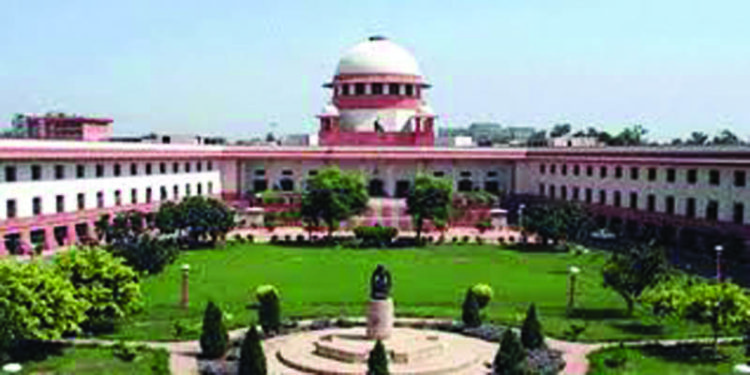NE NEWS SERVICE
NEW DELHI, NOV 13
Coming down hard on ‘bulldozer justice’, the Supreme Court on Wednesday laid down pan-India guidelines on demolition of properties and said the Executive cannot become a judge, declare an accused as guilty and demolish his house.
“If the Executive, in an arbitrary manner, demolishes the house of a citizen only on the ground that they are accused of a crime, then it acts contrary to the principles of rule of law,” a bench of Justices B R Gavai and K V Viswanathan said.
The Supreme Court on Wednesday called the act of demolishing the house of the accused “unconstitutional” and “illegal”.
Passing a slew of directions, the bench said, “No demolition should be carried out without a prior show cause notice returnable either in accordance with the time provided by the local municipal laws or within 15 days time from the date of service of such notice, whichever is later”.
“If the Executive acts as a judge and inflicts penalty of demolition on a citizen on the ground that he is an accused, it violates the principle of separation of powers,” the bench said.
The top court said in order to allay the fears in the mind of the citizens with regard to arbitrary exercise of powers by the officials of the State, “we find it necessary to issue certain directions in exercise of our powers under Article 142 of the Constitution”.
Article 142 empowers the apex court to pass any decree or order necessary for doing complete justice in any case or matter pending before it.
While pronouncing the judgement, the bench said even after order of demolition are passed, the affected parties needs to be given some time so as to challenge the order before an appropriate forum.
It said even in cases where people do not wish to contest the demolition order, sufficient time needs to be given to them to vacate and arrange their affairs.
“It is not a happy sight to see women, children and ailing persons dragged to the streets overnight,” it said, adding, “Heavens would not fall on the authorities if they hold their hands for some period”.
The bench directed that notice shall be served upon the owner by registered post and additionally, notice shall also be affixed on the outer portion of the structure.
“The time of 15 days state herein above shall start from the date of receipt of the said notice,” it said.
The top court delivered its verdict on pleas seeking framing of guidelines on demolition of properties in the country. It had reserved its verdict in the matter on October 1.
While hearing the matter, the top court had said it will lay down pan-India guidelines and made it clear that any religious structure in the middle of a road, be it a ‘dargah’ or a temple, “has to go” because public interest is paramount.
It had said merely because somebody is an accused or even a convict cannot be a ground for demolition of property.
Here are some of the observations made by the court.
- The SC called the act “transgressions of limits.” The chilling side of bulldozer reminds that constitutional values and ethos do not allow such abuse of power, the court said.
- The court also noted that demolishing the house of a person also affects the right to shelter under Article 21 of the Constitution, thereby becoming a collective punishment against the family members of the accused.
- The court said the construction of a house reflects socio-economic aspirations and a symbol of years of struggle. Taking away the right can be justified only if the authorities prove that such a measure was the only last resort, the court said.
- “The settled principle of criminal jurisprudence is that the accused is innocent till proven guilty and if the structure is demolished, then it is collective punishment on all family members which cannot be allowed under the Constitution,” the Court said.
- The court held that any government or public official responsible for such an illegal and arbitrary act should be made liable.
- The state is obliged to maintain law and order and protect a citizen who broke the law from unlawful action. Failing to adhere to this can lead to erosion of public confidence and give way to lawlessness.
- The directions issued by the court to curb bulldozer justice, include time to appeal against any order of demolition, and avoiding demolition without show cause notice.
- The show cause notice should include the nature of violations, the date on which a personal hearing for the affected party is fixed and before whom (which authority) it is fixed.
- The notice should also be sent to the Collector and District Magistrate (DM), who will appoint nodal officers in charge of demolition. Minutes of the personal hearing before the concerned authority have to be recorded.
- The owner of the property should be given an opportunity to demolish or remove the unauthorised structure within 15 days of the order and only if the appellate body has not stayed the order, the steps of demolition shall take place.










